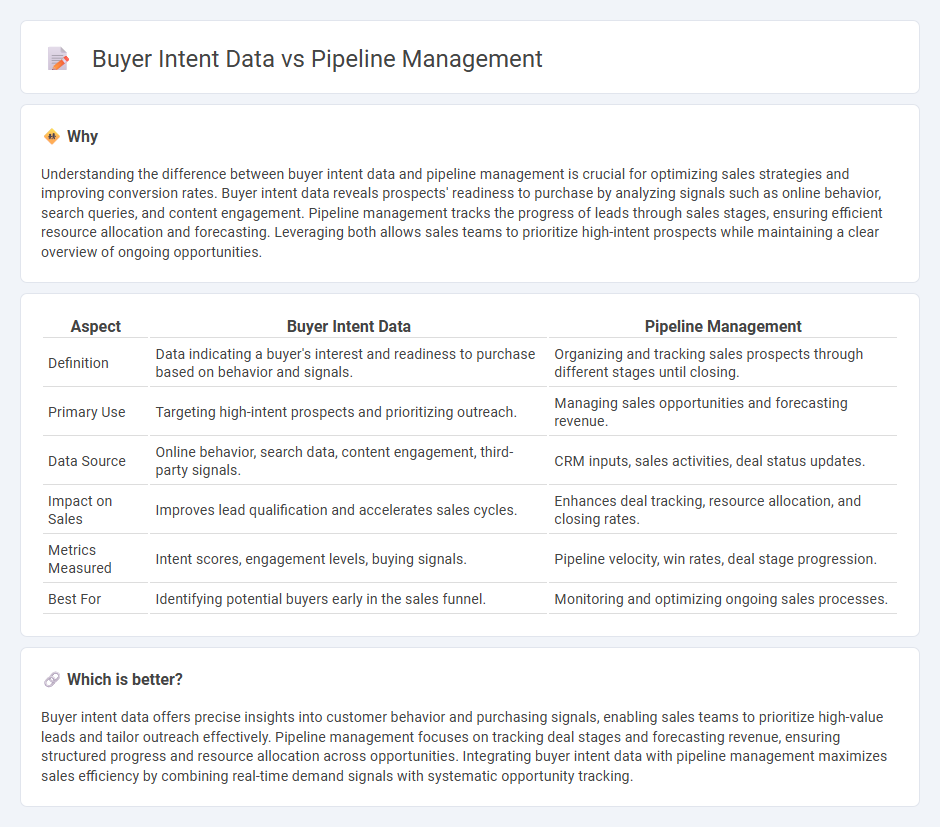
Buyer intent data reveals potential customers' interests by analyzing online behavior, enabling sales teams to prioritize leads with higher conversion probability. Pipeline management organizes and tracks sales prospects through each stage, ensuring efficient follow-up and resource allocation. Explore how integrating buyer intent data with pipeline management can maximize sales effectiveness.
Why it is important
Understanding the difference between buyer intent data and pipeline management is crucial for optimizing sales strategies and improving conversion rates. Buyer intent data reveals prospects' readiness to purchase by analyzing signals such as online behavior, search queries, and content engagement. Pipeline management tracks the progress of leads through sales stages, ensuring efficient resource allocation and forecasting. Leveraging both allows sales teams to prioritize high-intent prospects while maintaining a clear overview of ongoing opportunities.
Comparison Table
| Aspect | Buyer Intent Data | Pipeline Management |
|---|---|---|
| Definition | Data indicating a buyer's interest and readiness to purchase based on behavior and signals. | Organizing and tracking sales prospects through different stages until closing. |
| Primary Use | Targeting high-intent prospects and prioritizing outreach. | Managing sales opportunities and forecasting revenue. |
| Data Source | Online behavior, search data, content engagement, third-party signals. | CRM inputs, sales activities, deal status updates. |
| Impact on Sales | Improves lead qualification and accelerates sales cycles. | Enhances deal tracking, resource allocation, and closing rates. |
| Metrics Measured | Intent scores, engagement levels, buying signals. | Pipeline velocity, win rates, deal stage progression. |
| Best For | Identifying potential buyers early in the sales funnel. | Monitoring and optimizing ongoing sales processes. |
Which is better?
Buyer intent data offers precise insights into customer behavior and purchasing signals, enabling sales teams to prioritize high-value leads and tailor outreach effectively. Pipeline management focuses on tracking deal stages and forecasting revenue, ensuring structured progress and resource allocation across opportunities. Integrating buyer intent data with pipeline management maximizes sales efficiency by combining real-time demand signals with systematic opportunity tracking.
Connection
Buyer intent data enhances pipeline management by providing real-time insights into potential customers' behaviors, enabling sales teams to prioritize leads more effectively. Integrating intent data with CRM systems allows for accurate forecasting and targeted follow-ups, increasing conversion rates. Leveraging this connection optimizes resource allocation and accelerates the sales cycle.
Key Terms
**Pipeline Management:**
Pipeline management involves systematically tracking and optimizing each stage of the sales process to improve conversion rates and forecast revenue accurately. Effective pipeline management tools provide real-time visibility into deal progress, resource allocation, and sales team performance metrics to drive informed decision-making. Explore how advanced pipeline management techniques can transform your sales strategy and accelerate your business growth.
Lead Stages
Pipeline management organizes leads through defined stages like prospecting, qualification, and closing, ensuring structured progress tracking. Buyer intent data signals potential customers' readiness to purchase by analyzing behaviors such as search queries, content engagement, and digital footprints. Explore how integrating buyer intent data with pipeline management can enhance lead stage prioritization and conversion rates.
Forecasting
Pipeline management uses historical sales data and current deal stages to predict revenue, improving forecast accuracy. Buyer intent data analyzes behavioral signals to identify prospects' readiness to purchase, enhancing the precision of sales forecasts. Explore how integrating both can optimize your sales forecasting strategy.
Source and External Links
What is pipeline management? - Pipeline management is the practice of overseeing, directing, and optimizing sales opportunities as they move through each stage of the sales cycle, using analysis, key metrics, and regular updates to boost revenue and efficiency.
What is Pipeline Management? - Sales pipeline management involves maintaining a healthy pipeline by tracking leads at every stage, managing their progress and needs, and using tools like CRM software to handle multiple prospects effectively.
Sales Pipeline Management: The Complete Guide - Sales pipeline management is the process of guiding and improving how sales opportunities move through different stages, helping teams prioritize leads, avoid inefficiency, and foster better customer relationships.
 dowidth.com
dowidth.com